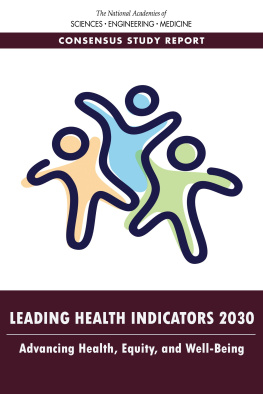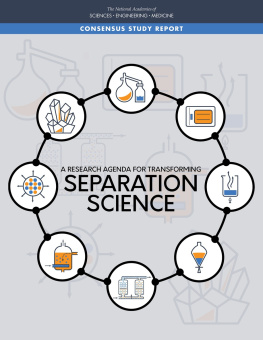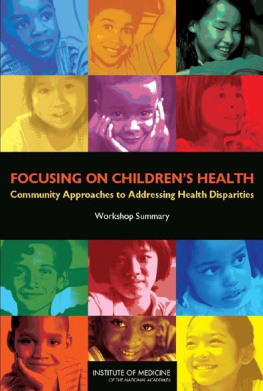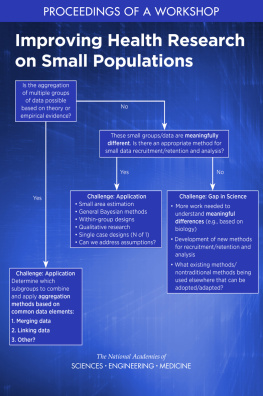National Academies of Sciences - Leading Health Indicators 2030: Advancing Health, Equity, and Well-Being
Here you can read online National Academies of Sciences - Leading Health Indicators 2030: Advancing Health, Equity, and Well-Being full text of the book (entire story) in english for free. Download pdf and epub, get meaning, cover and reviews about this ebook. year: 2020, publisher: The National Academies Press, genre: Politics. Description of the work, (preface) as well as reviews are available. Best literature library LitArk.com created for fans of good reading and offers a wide selection of genres:
Romance novel
Science fiction
Adventure
Detective
Science
History
Home and family
Prose
Art
Politics
Computer
Non-fiction
Religion
Business
Children
Humor
Choose a favorite category and find really read worthwhile books. Enjoy immersion in the world of imagination, feel the emotions of the characters or learn something new for yourself, make an fascinating discovery.
- Book:Leading Health Indicators 2030: Advancing Health, Equity, and Well-Being
- Author:
- Publisher:The National Academies Press
- Genre:
- Year:2020
- Rating:3 / 5
- Favourites:Add to favourites
- Your mark:
- 60
- 1
- 2
- 3
- 4
- 5
Leading Health Indicators 2030: Advancing Health, Equity, and Well-Being: summary, description and annotation
We offer to read an annotation, description, summary or preface (depends on what the author of the book "Leading Health Indicators 2030: Advancing Health, Equity, and Well-Being" wrote himself). If you haven't found the necessary information about the book — write in the comments, we will try to find it.
Leading Health Indicators 2030: Advancing Health, Equity, and Well-Being — read online for free the complete book (whole text) full work
Below is the text of the book, divided by pages. System saving the place of the last page read, allows you to conveniently read the book "Leading Health Indicators 2030: Advancing Health, Equity, and Well-Being" online for free, without having to search again every time where you left off. Put a bookmark, and you can go to the page where you finished reading at any time.
Font size:
Interval:
Bookmark:

THE NATIONAL ACADEMIES PRESS 500 Fifth Street, NW Washington, DC 20001
This activity was supported by a contract between the National Academy of Sciences and the Department of Health and Human Services (HHSP233201400020B). Any opinions, findings, conclusions, or recommendations expressed in this publication do not necessarily reflect the views of any organization or agency that provided support for the project.
International Standard Book Number-13: 978-0-309-67187-3
International Standard Book Number-10: 0-309-67187-6
Digital Object Identifier: https://doi.org/10.17226/25682
Epub ISBN: 978-0-309-67190-3
Additional copies of this publication are available from the National Academies Press, 500 Fifth Street, NW, Keck 360, Washington, DC 20001; (800) 624-6242 or (202) 334-3313; http://www.nap.edu.
Copyright 2020 by the National Academy of Sciences. All rights reserved.
Printed in the United States of America
Suggested citation: National Academies of Sciences, Engineering, and Medicine. 2020. Leading Health Indicators 2030: Advancing health, equity, and well-being. Washington, DC: The National Academies Press. https://doi.org/10.17226/25682.

The National Academy of Sciences was established in 1863 by an Act of Congress, signed by President Lincoln, as a private, nongovernmental institution to advise the nation on issues related to science and technology. Members are elected by their peers for outstanding contributions to research. Dr. Marcia McNutt is president.
The National Academy of Engineering was established in 1964 under the charter of the National Academy of Sciences to bring the practices of engineering to advising the nation. Members are elected by their peers for extraordinary contributions to engineering. Dr. John L. Anderson is president.
The National Academy of Medicine (formerly the Institute of Medicine) was established in 1970 under the charter of the National Academy of Sciences to advise the nation on medical and health issues. Members are elected by their peers for distinguished contributions to medicine and health. Dr. Victor J. Dzau is president.
The three Academies work together as the National Academies of Sciences, Engineering, and Medicine to provide independent, objective analysis and advice to the nation and conduct other activities to solve complex problems and inform public policy decisions. The National Academies also encourage education and research, recognize outstanding contributions to knowledge, and increase public understanding in matters of science, engineering, and medicine.
Learn more about the National Academies of Sciences, Engineering, and Medicine at www.nationalacademies.org.

Consensus Study Reports published by the National Academies of Sciences, Engineering, and Medicine document the evidence-based consensus on the studys statement of task by an authoring committee of experts. Reports typically include findings, conclusions, and recommendations based on information gathered by the committee and the committees deliberations. Each report has been subjected to a rigorous and independent peer-review process and it represents the position of the National Academies on the statement of task.
Proceedings published by the National Academies of Sciences, Engineering, and Medicine chronicle the presentations and discussions at a workshop, symposium, or other event convened by the National Academies. The statements and opinions contained in proceedings are those of the participants and are not endorsed by other participants, the planning committee, or the National Academies.
For information about other products and activities of the National Academies, please visit www.nationalacademies.org/about/whatwedo.
GEORGE J. ISHAM (Chair), Senior Fellow, HealthPartners Institute
L. EBONY BOULWARE, Professor of Medicine; Chief, Division of General Internal Medicine; Vice Dean, Translational Science; Associate Vice Chancellor, Translational Research, School of Medicine, Duke University
GILBERT GEE, Professor, Department of Community Health Sciences, Fielding School of Public Health, University of California, Los Angeles
MARTHE R. GOLD, Senior Scholar, The New York Academy of Medicine
SHERI JOHNSON, Director, Population Health Institute, Associate Professor, Department of Population Health Sciences, School of Medicine and Public Health, University of WisconsinMadison
PAULA LANTZ, Associate Dean for Academic Affairs, Professor of Public Policy, Gerald R. Ford School of Public Policy, University of Michigan
DARCY PHELAN-EMRICK, Chief Epidemiologist, Baltimore City Health Department; Associate Scientist, Bloomberg School of Public Health, Johns Hopkins University
JONATHAN S. SKINNER, James O. Freedman Presidential Professor in Economics, Department of Economics, Dartmouth Institute for Health Policy and Clinical Practice, Geisel School of Medicine, Dartmouth College
ALINA B. BACIU, Study Director
CARLA S. ALVARADO, Program Officer
ANNA W. MARTIN, Administrative Assistant
ROSE MARIE MARTINEZ, Senior Director, Board on Population Health and Public Health Practice
This Consensus Study Report was reviewed in draft form by individuals chosen for their diverse perspectives and technical expertise. The purpose of this independent review is to provide candid and critical comments that will assist the National Academies of Sciences, Engineering, and Medicine in making each published report as sound as possible and to ensure that it meets the institutional standards for quality, objectivity, evidence, and responsiveness to the study charge. The review comments and draft manuscript remain confidential to protect the integrity of the deliberative process.
We thank the following individuals for their review of this report:
JOHN AUERBACH, Trust for Americas Health
ANA DIEZ ROUX, Drexel University
CYNTHIA HAQ, University of California, Irvine
JEWEL MULLEN, University of Texas at Austin Dell Medical School
JOS A. PAGAN, New York University
STEVEN M. TEUTSCH, University of California, Los Angeles, and University of Southern California
Although the reviewers listed above provided many constructive comments and suggestions, they were not asked to endorse the conclusions or recommendations of this report nor did they see the final draft before its release. The review of this report was overseen by ERIC B. LARSON, Kaiser Permanente Washington, and JAMES S. HOUSE, University of Michigan. They were responsible for making certain that an independent examination of this report was carried out in accordance with the standards of the National Academies and that all review comments were carefully considered. Responsibility for the final content rests entirely with the authoring committee and the National Academies.
The committee wishes to thank and acknowledge the many individuals and organizations that contributed to the study process and development of this report.
Next pageFont size:
Interval:
Bookmark:
Similar books «Leading Health Indicators 2030: Advancing Health, Equity, and Well-Being»
Look at similar books to Leading Health Indicators 2030: Advancing Health, Equity, and Well-Being. We have selected literature similar in name and meaning in the hope of providing readers with more options to find new, interesting, not yet read works.
Discussion, reviews of the book Leading Health Indicators 2030: Advancing Health, Equity, and Well-Being and just readers' own opinions. Leave your comments, write what you think about the work, its meaning or the main characters. Specify what exactly you liked and what you didn't like, and why you think so.







